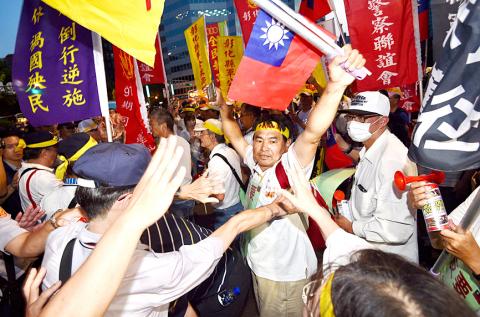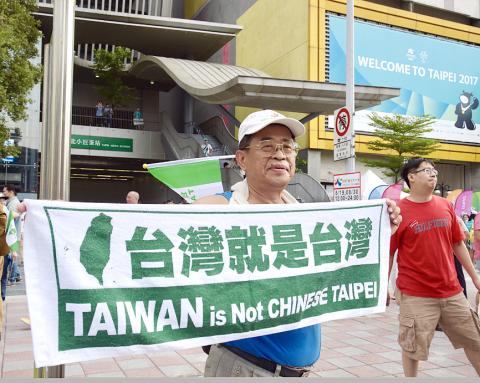Several groups, including opponents of pension reform, yesterday staged protests outside the Taipei Municipal Stadium during the Summer Universiade opening ceremony.
Hundreds of pensioners rallied at Meiren Park before setting out on a march around the barricaded stadium, during which they shouted slogans demanding that President Tsai Ing-wen (蔡英文) step down.
Tainan Police Fraternity members blasted air horns near an entrance just as people started arriving at the stadium. They broke through a police line to march down Beining Road in an attempt to approach the venue.

Photo: Peter Lo, Taipei Times
“We are not the ones who blocked this off, you are,” fraternity executive secretary Chen Ching-tsung (陳金宗) said after police blocked the marchers.
Protestors said they wanted to “cheer for the Republic of China team” and scuffled with police before joining other groups in a march around the cordoned-off security zone.
Police erected barriers along both sides of Dunhua, Bade and Nanjing roads.

Photo: Huang Yao-cheng, Taipei Times
“We are not interfering with the event site — there should not be anything wrong with protesting outside,” said Taiwan Veteran Rights Protection Association president Huang Cheng-chung (黃正忠), one of the protest organizers, adding that organizers wanted to attract Tsai’s attention.
“We want to make sure President Tsai does not feel good because she caused us a lot of suffering,” Taiwan Education Retirees Association director Alice Wu (吳錦秀) said, referring to pension cuts passed in June. “Many foreigners have come here and we want them to know how the government treats its soldiers, teachers and civil servants.”
Pensioners were not the only group staging protests outside the stadium.
A group of Tibetans draped in their national flags protested “illegal Chinese expansion” meters away from Chinese Unification Promotion Party members waving the Chinese flag.
Green-and-white symbolic “Taiwan” flags were a common sight outside the stadium, as members of the pro-independence Taiwan Radical Wings Party rallied to promote their cause.
Several thousand of the flags were printed using donations from Taiwanese living in the US, the party’s publicity and public opinion department deputy directory Joyce Lin (林春妙) said.
While the right to carry the flags into the venue caused contention after the Taipei City Government banned political materials other than the Republic of China flag, enforcement was lax with numerous people carrying the flags past police officers and into the stadium, while one woman was required to discard her flag.
The Chinese-language Liberty Times (sister newspaper of the Taipei Times) yesterday reported that Taipei police decided it would not tolerate any such flags as they contain explicitly political messages such as “Taiwan is not the Republic of China.”

NATIONAL SECURITY THREAT: An official said that Guan Guan’s comments had gone beyond the threshold of free speech, as she advocated for the destruction of the ROC China-born media influencer Guan Guan’s (關關) residency permit has been revoked for repeatedly posting pro-China content that threatens national security, the National Immigration Agency said yesterday. Guan Guan has said many controversial things in her videos posted to Douyin (抖音), including “the red flag will soon be painted all over Taiwan” and “Taiwan is an inseparable part of China,” while expressing hope for expedited “reunification.” The agency received multiple reports alleging that Guan Guan had advocated for armed reunification last year. After investigating, the agency last month issued a notice requiring her to appear and account for her actions. Guan Guan appeared as required,

A strong cold air mass is expected to arrive tonight, bringing a change in weather and a drop in temperature, the Central Weather Administration (CWA) said. The coldest time would be early on Thursday morning, with temperatures in some areas dipping as low as 8°C, it said. Daytime highs yesterday were 22°C to 24°C in northern and eastern Taiwan, and about 25°C to 28°C in the central and southern regions, it said. However, nighttime lows would dip to about 15°C to 16°C in central and northern Taiwan as well as the northeast, and 17°C to 19°C elsewhere, it said. Tropical Storm Nokaen, currently

‘NATO-PLUS’: ‘Our strategic partners in the Indo-Pacific are facing increasing aggression by the Chinese Communist Party,’ US Representative Rob Wittman said The US House of Representatives on Monday released its version of the Consolidated Appropriations Act, which includes US$1.15 billion to support security cooperation with Taiwan. The omnibus act, covering US$1.2 trillion of spending, allocates US$1 billion for the Taiwan Security Cooperation Initiative, as well as US$150 million for the replacement of defense articles and reimbursement of defense services provided to Taiwan. The fund allocations were based on the US National Defense Authorization Act for fiscal 2026 that was passed by the US Congress last month and authorized up to US$1 billion to the US Defense Security Cooperation Agency in support of the

PAPERS, PLEASE: The gang exploited the high value of the passports, selling them at inflated prices to Chinese buyers, who would treat them as ‘invisibility cloaks’ The Yilan District Court has handed four members of a syndicate prison terms ranging from one year and two months to two years and two months for their involvement in a scheme to purchase Taiwanese passports and resell them abroad at a massive markup. A Chinese human smuggling syndicate purchased Taiwanese passports through local criminal networks, exploiting the passports’ visa-free travel privileges to turn a profit of more than 20 times the original price, the court said. Such criminal organizations enable people to impersonate Taiwanese when entering and exiting Taiwan and other countries, undermining social order and the credibility of the nation’s